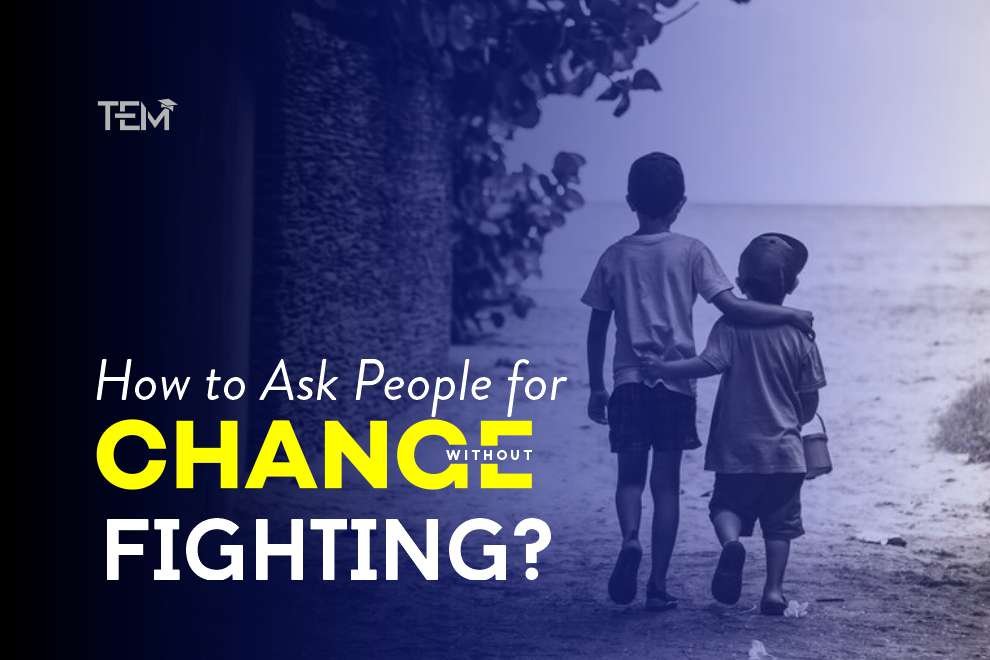People, you and I don’t like to be told what to do and what not to do. It’s just the fact. Human beings don’t like to be bossed anymore. It takes a lot of courage and humbleness in order to accept people’s feedback. Most of the times we have two choices while convincing people to create change. We can either have a conversation that works, helps them see who they could be, and what they could do differently or we can help them stay stuck in angry where they can tell us you don’t understand and the conversation goes in the wrong way. So, instead of helping them see something and change something it actually turns into a fight. I’m sure you all know what I am talking about; you’ve all been in that situation where we trying to do something good but actually backfires on us.
So how do you hold the right type of conversation with other people when you notice something; that they could do differently or that’s not working for them and you want to give them feedback? How do you have the right type of conversation and not the wrong type of conversation that turns into a fight?
If we just tell them what they should do differently or what they’re doing wrong; it’s not going to work. Because again, most of the time they know it already. They’re kind of aware of it. So just telling them is not going to make them change. It’s not going to change their pattern of thinking.
However, if they really want to work hard on themselves and try to accept the right thing, they have to go through inner struggle first. For example; you notice a person when he talks to people gets super aggressive with the words. So there is defensiveness. One day he was talking to someone and he said, “Yeah! I know.” He kept saying, “I know,” “I told you already why you aren’t listening to me.”
So you noticed that he has defensiveness in his conversation. You think what he is doing is not a good thing. You’re going to give him feedback. You’re going to say something like, “Hey! You shouldn’t do that. You’re super defensive and you shouldn’t be. Look at the poor person and what you did to him. Automatically, that person you’re giving feedback will be defensive again and will give excuses for life or try to explain why he is behaving in a certain way. “You don’t understand me.” That internal struggle triggers.
What we need is having an intellectual conversation with him and starts engaging with heart. Here is where empathy is really important. If we want to help other people to create a new behavior, create a new way of being—ask who they could be. Show them some empathy, show them that we understand them, we are not judging them—in order to keep that internal struggle away. Because a lot of time we act the way we act for a reason. That person is defensive for a reason. And it’s not we can say, “Hey! It’s okay. I know that you probably behaving that way because of something that really matters to you. And that’s why you tend to act this way. I understand it’s okay. We’re not judging you.”
Listen to what they are saying. Pay attention to them all. Switch off your cell phone, focus mentally on them, and pay attention to all your senses. Not only hearing their words but also studying their body language and listening to their tone. Do not interrupt, but make signs like nodding, that you are listening.
Don’t argue to them. One of the most hurtful things that you can tell someone who needs help is that their feelings are incorrect. Trust that what they say is true for them, and do so even if you don’t fully understand why they believe as they do.
Learn them through questions. Carefully proceed but asking questions can be a great way to show you are listening actively and trying to understand. It’s good to be deferential; instead of saying “why did this?” you might ask “I’m trying to understand, would you be willing to talk about why you made that choice?”
Offer assistance. Don’t count on that you understand how to assist any person with a challenging situation. Ask “How can I support you with this?” or “What can I do to help?” If the man or woman affords you a way to help, don’t argue with them. Trust that they comprehend their scenario better than they do.
Also Read,
15 Powerful Quotes On Racism To Learn To Respect ‘People Of Color’
15 Healing Mental Health Quotes To Fight And Overcome Depression


